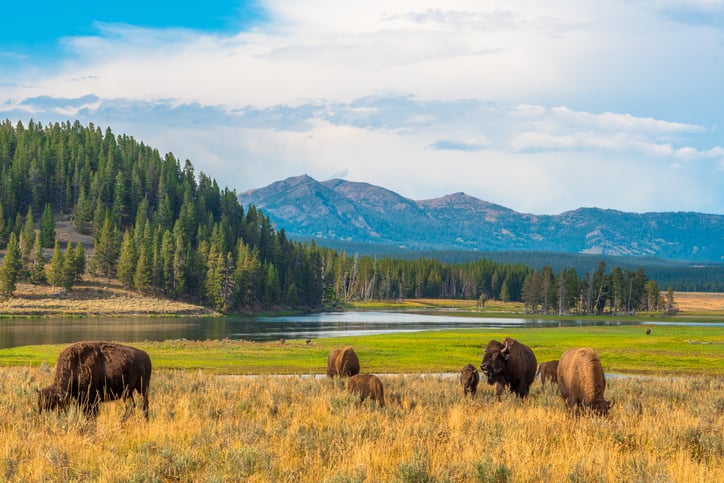Treks to stunning waterfalls, geyser basins, plunging canyons, and more await day trippers.
Most of Yellowstone National Park actually can’t be seen from the road – 98% is off the beaten path. Yellowstone National Park covers more than 2.2 million acres with more than 900 miles of hiking trails in backcountry wilderness. Treks to stunning waterfalls, geyser basins, plunging canyons, and more await day-trippers. If you can’t find a trail here, you can’t find it anywhere.
Stop by a ranger station or the visitor center for the latest information on the condition of trails. They may be closed. Ask about bear activity, weather, and fires in the area. No permit is required for day hiking in Yellowstone. Or check out the Backcountry Situation report.
It’s impossible to explore all the beauty Yellowstone hiking has to offer. It’s hard to know where to begin when you hit the trails. So we’ve identified 12 of the best hikes in Yellowstone, each with a charm and a challenge.
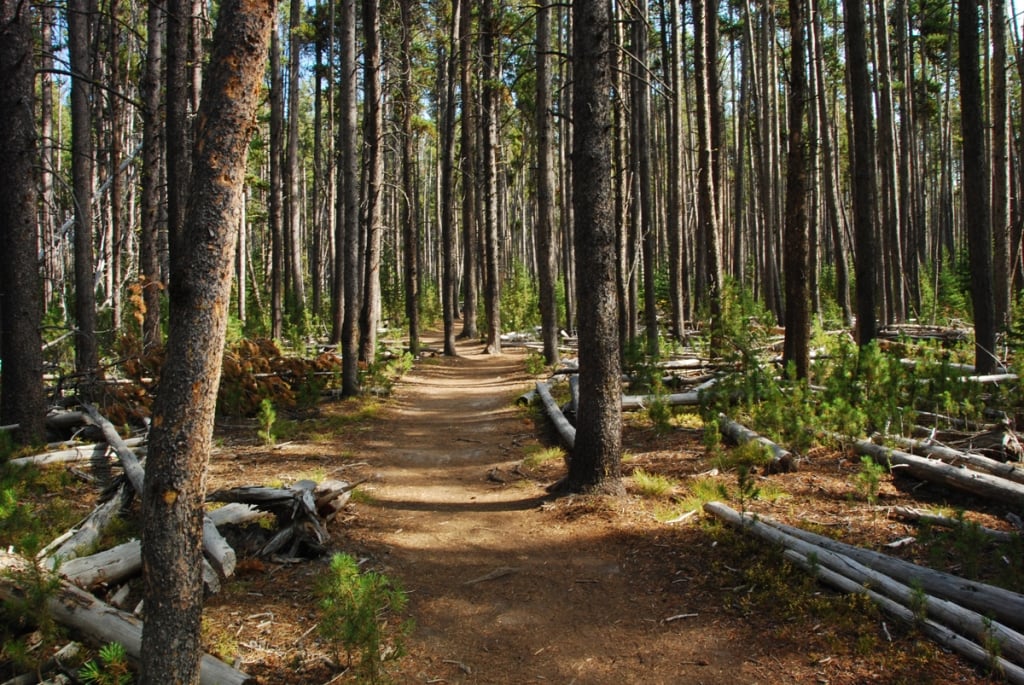
Storm Point Loop Trail
Level of Difficulty: Easy
Location: Fishing Bridge and Lake Village Area
This is a flat, fun 2.3-mile loop through a forest leading to a rocky peninsula jutting into Lake Yellowstone. You get the trifecta of forest, beach, and water all in one trip.
The Reward: A great place to get away from the crowds and enjoy the beauty of a wilderness sunrise or sunset with panoramic views of Yellowstone Lake.
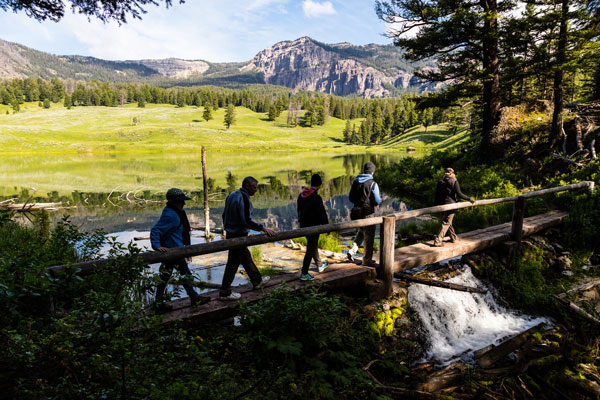
Trout Lake
Difficulty: Easy
Location: Trout Lake
The Trout Lake hike is a pleasant 1.2-mile walk in the woods where you might see otters feeding on cutthroat trout in the river or bears foraging. Ospreys dart from the sky to fish as well. The trail rises 150 feet through a Douglas fir forest to a picturesque mountain lake.
The Reward: A chance for some stellar wildlife viewing. Bring your binoculars.
Mystic Falls
Level of Difficulty: Easy
Location: Old Faithful Area
Head on a 2.0-mile trek through new growth forest then climb to the falls, where the river drops 70 feet as it rushes through a narrow slot. Often, geothermal activity creates an eerie steam. For more out of your trek, continue climbing past the falls to the junction with Fairy Creek Trail and head to the Biscuit Basin overlook.
The Reward: Great views and one of Yellowstone’s classic waterfalls.
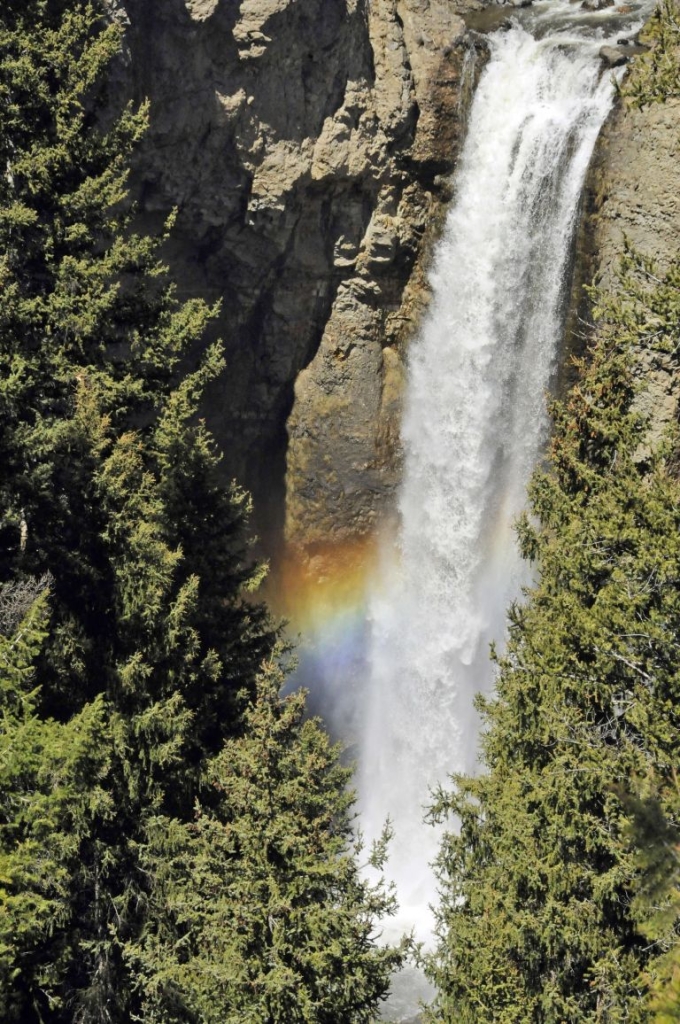
Tower Fall Overlook
Level of Difficulty: Easy
Location: Tower-Roosevelt region
The 132-foot waterfall on Tower Creek is stunning, crashing onto the rocks below. This very short hike features minarets sculpted by water through the basalt formation.
The Reward: A stellar photo opportunity for very little effort.
Note: No access to Tower Fall until May 2022. For more info, visit the NPS website.
Uncle Tom’s Trail (From Artist Point)
Level of difficulty: Moderate
Location: Canyon Area
Go ahead, take the stairs (328 steps), if you dare. Uncle Tom’s Trail carries you from the top of the Grand Canyon of the Yellowstone to the base of the 308-foot Lower Falls. This is more like climbing down and then back up a 20-story building. The vertical elevation change is about 500 feet at a steep angle. Don’t worry. There are plenty of benches and places to rest.
The Reward: The iconic Yellowstone view of the waterfalls from the bottom of the trail, complete with a rainbow if you’re lucky.
Note: In 2021, the stairs are closed. Trail from Artist Point to Uncle Tom’s Parking area remains open. For more info, visit the NPS website.
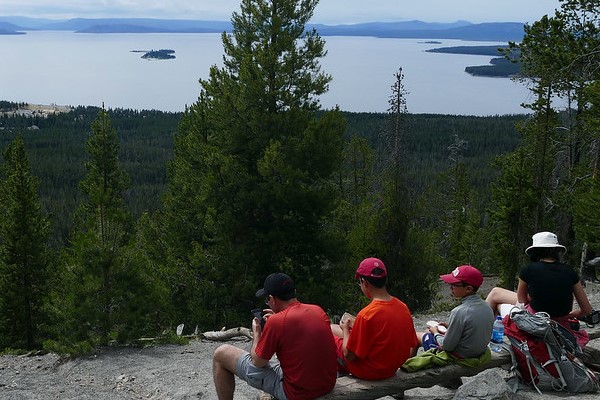
Elephant Back Mountain Trail
Level of Difficulty: Moderate
Location: Fishing Bridge and Lake Village Area
Make time for this short 3.5-mile hike with stunning views across Yellowstone Lake and the peaks that border its eastern edge. The hike gains 800 feet to the summit, but the trail is well maintained and it doesn’t feel that steep. The forest is open, making the viewing even easier. Try late afternoon or early evening for the best light.
The Reward: Climbing a mountain without breaking too much of a sweat for an incredible vista.
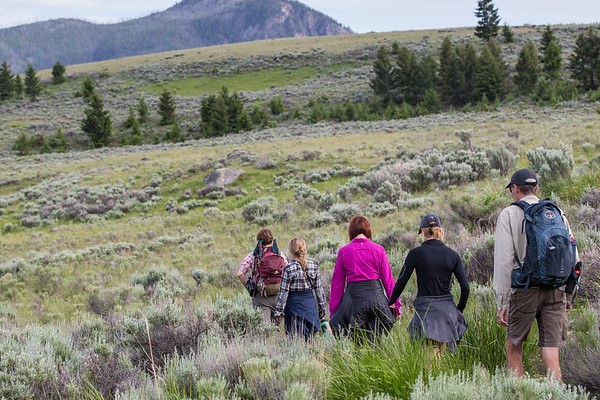
Beaver Ponds Loop
Level of Difficulty: Moderate
Location: Mammoth Hot Springs Area
The 5-mile trail through forest and sage meadows begins steep, but mellows out with views of Gardner Canyon and leads to the ponds, which features a beaver dam and lodge. It’s generally not crowded and offers a good chance to see wildlife.
The Reward: Feeling like you’re alone in the backcountry wilderness on just a short hike.
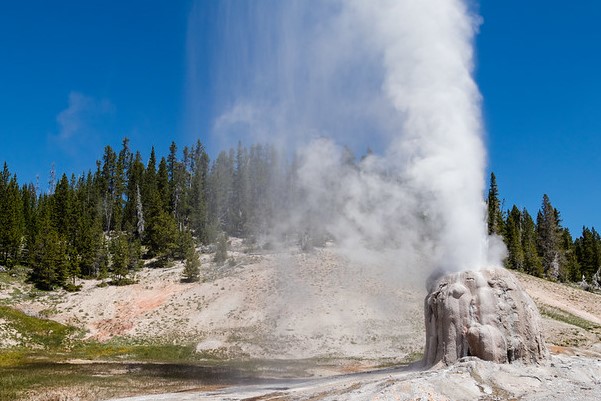
Lone Star Geyser
Level of Difficulty: Easy
Location: Old Faithful Area
This five-mile round trip starts with a cascade of falls and follows a river, first on one side and then the other, through a wooded valley to reach the centerpiece of Yellowstone’s four backcountry geyser basins. The Lone Star Geyser erupts 30-45 feet about every three hours. There are several log benches in the area where hikers can sit and watch for the geyser.
The Reward: The best geyser and river hike combination in the park.
South Rim of the Canyon
Level of Difficulty: Moderate
Location: Canyon Area
This is a must-do, a hike along the rim of the Grand Canyon of the Yellowstone with stunning panoramic views of both the canyon and falls. The canyon is 20 miles long and from 800 to 1,200 feet deep, though the trail is a 4.5 mile loop when done completely. At Artist Point, you will have an iconic view to rival the tunnel view at Yosemite or the view from the South Rim of the Grand Canyon.
The Reward: A chance to experience the roiling river and the stunning rhyolite rock formations of the canyon, guaranteed to fill the memory card on your camera.
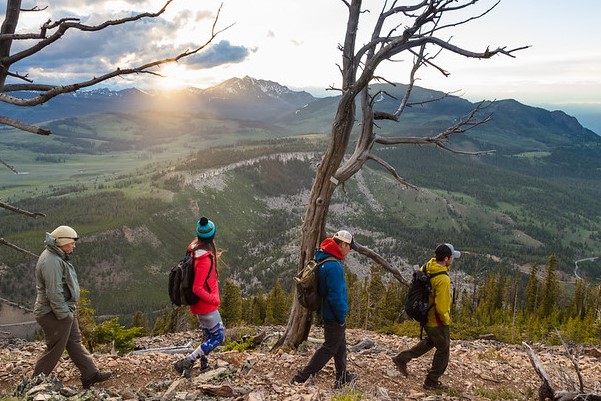
Bunsen Peak Trail
Level of Difficulty: Strenuous
Location: Bunsen Peak
This four-mile hike is short, but requires some work nearing the summit to climb a series of steep switchbacks. The vistas of the Gallatin Mountain Range are the best in the park. You’ll pass a stand of dead trees with an otherworldly feel and a rock formation called Cathedral Rock. There are plenty of photo opportunities.
The Reward: If you’re lucky you may reach the telecommunications equipment on top and find you have the summit all to yourself.
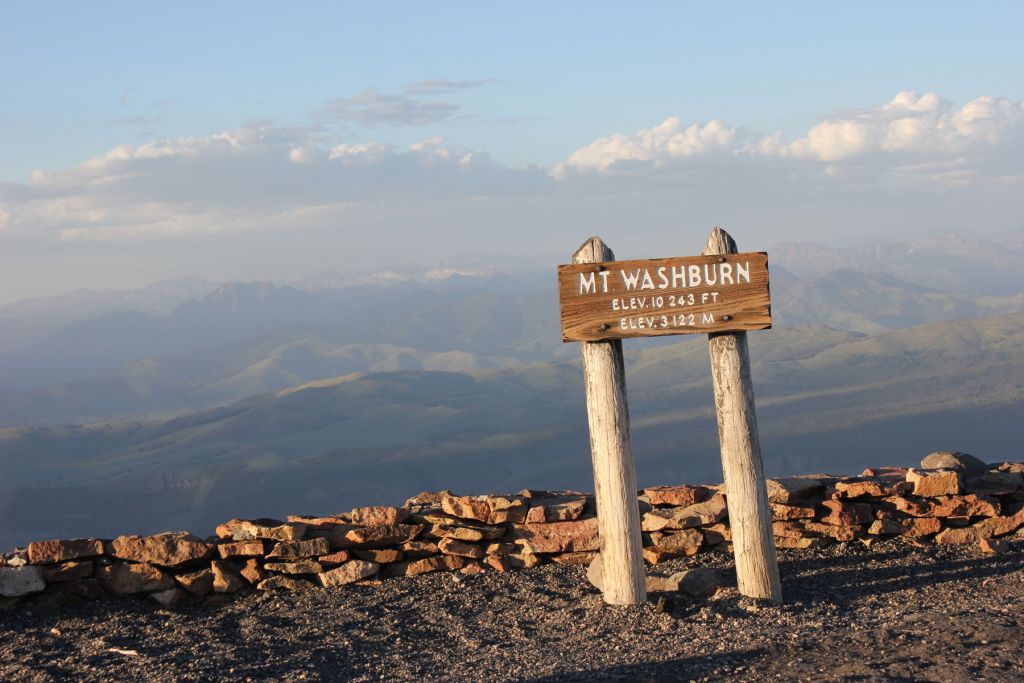
Mount Washburn Trail
Level of Difficulty: Strenuous
Location: Canyon Area
The 5-6-mile trail switches back and forth through a forested area with mountain top views of the Grand Tetons, and iconic in-park features like Old Faithful Geyser Basin and the Grand Canyon of the Yellowstone. During July, wildflowers blanket the mountain. You’re likely to see bighorn sheep. Nearing the summit, the temperature drops and there are often afternoon storms. Start early if you want to avoid them.
The Reward: It will seem like you’re on the top of the world. You can sit inside the lookout on top and take panoramic shots in comfort at 10,243 feet.
Note: No access to Mount Washburn until May 2022. For more info, visit the NPS website.
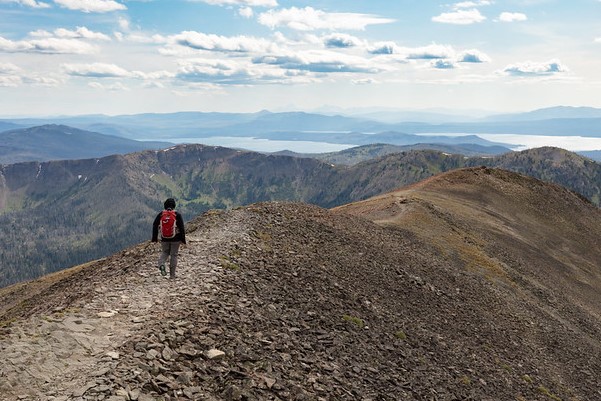
Avalanche Peak
Level of Difficulty: Strenuous
Location: Fishing Bridge and Lake Village Area
For many Yellowstone veterans, this is their favorite hike. It begins through forests of meadows with wildflowers, passes gurgling streams, may feature patches of snow even in summer, and concludes 2,100 feet higher on a barren peak with views that stretch across Lake Yellowstone, the Tetons, and the Absaroka Range. When the trail offers options, stick to the left so you can traverse the length of the ridge with the best views.
The Reward: Isn’t the climb enough? OK, take a look at that view. Rock shelters on top make for a great place to share a sandwich.
When you are hiking Yellowstone, take along this handy infographic that summarizes the best hiking in Yellowstone.

Want to hit the trails with an experienced guide? Join one of our lodging and learning programs in partnership with the Yellowstone Forever Institute on our Trails through Yellowstone program!
Contributors to this article include Jim Morrison
For more travel experiences to Beautiful Places on Earth™ available from Xanterra Travel Collection® and its affiliated properties, visit xanterra.com/explore.
Want to experience Yellowstone in depth? See what makes Yellowstone National Park a great place to work for a season or longer!


